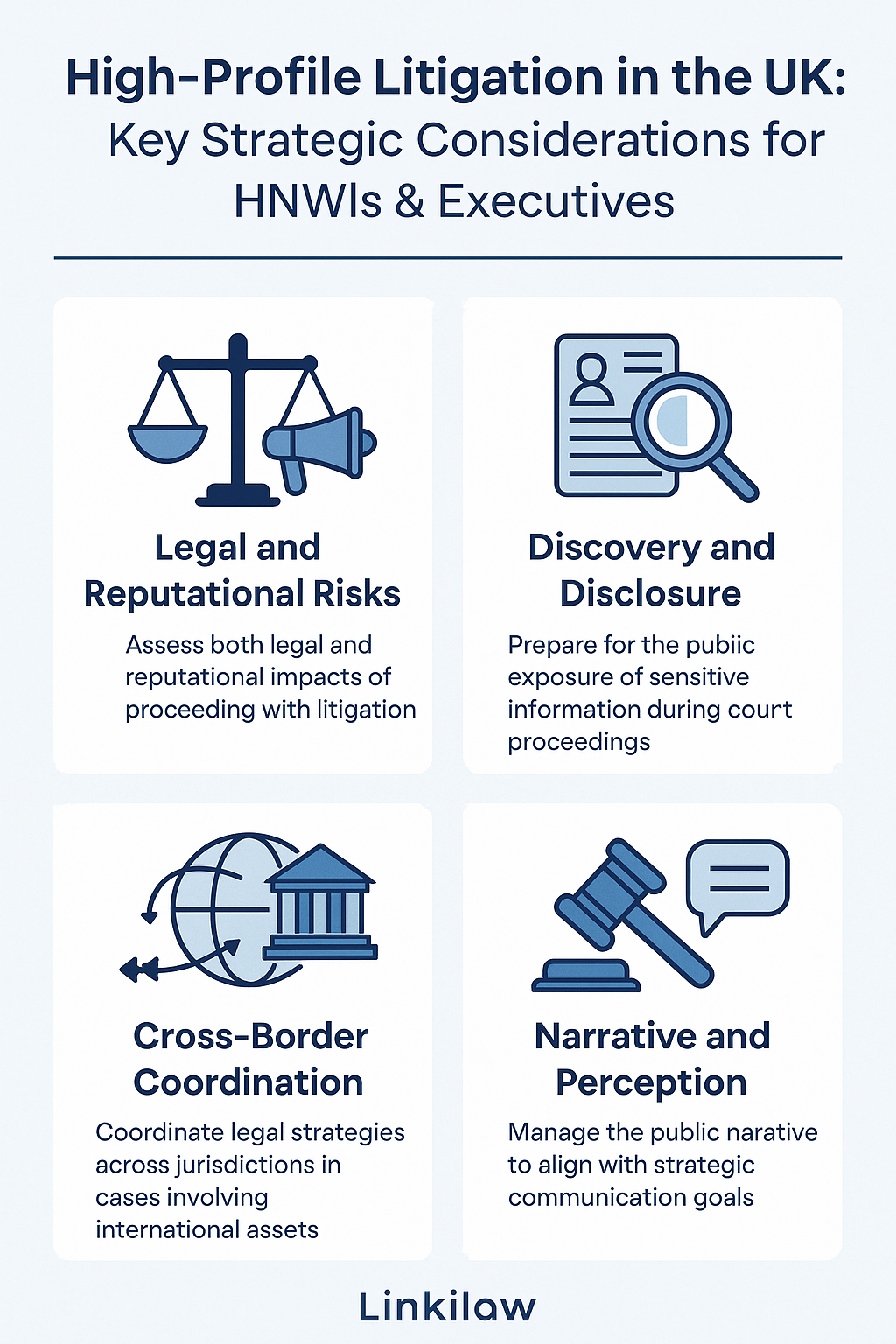Navigating Legal Risk, Reputational Fallout, and Strategic Complexity in the Public Eye
Litigation involving high-net-worth individuals (HNWIs), family offices, and senior executives is never just about law. When it unfolds in UK courts, especially London’s High Court, it becomes a public, strategic, and reputational event. At this level, disputes are not just legal contests; they are crises that must be meticulously managed.
Whether you are launching a claim to protect your reputation, defending yourself in a commercial dispute, or caught in complex shareholder litigation, there are crucial realities to understand before entering the UK courtroom. This guide unpacks the legal landscape, reputational risks, and strategic decisions HNWIs and executives must weigh when involved in high-profile litigation in the UK.

1. Why the UK Attracts High-Stakes Disputes
The UK is one of the most popular jurisdictions in the world for international litigation. London’s courts are globally respected for their independence, procedural fairness, and the enforceability of judgments. These features make the UK particularly attractive in disputes involving large sums of money, complex cross-border issues, or delicate matters of reputation and trust.
It’s not uncommon for wealthy individuals, sovereign wealth funds, multinational companies, or ultra-high-net-worth families to choose UK courts, even when the events giving rise to the dispute occurred abroad. Contractual clauses often select English law and London jurisdiction precisely because of this predictability.
But with this prestige comes public exposure. Unlike arbitration or private settlement, litigation in the UK is generally open to the public. Filings, evidence, and hearings are presumptively transparent. Many cases involving HNWIs, like Abramovich v Berezovsky, Pugachev, or Gurbanguly Berdymukhamedov’s offshore structures, have been widely reported in the global press. Once a matter enters the High Court, it often enters the court of public opinion too.
2. The Dual Risk: Legal Exposure and Public Reputation
Litigation brings legal risks such as loss of assets, adverse judgments, legal costs. However, for high-profile individuals and organisations, the reputational risk is often greater.
Allegations made in pleadings, even if unfounded, can tarnish reputations. Sensitive personal or commercial information disclosed through witness statements, bank records, or cross-examination can damage brand equity, unsettle investors, or fuel political attacks. In some cases, media coverage creates more lasting harm than the judgment itself.
It’s crucial to understand: UK litigation is not a private affair. There is a strong presumption in favour of open justice. Many filings are accessible via online platforms, and journalists regularly attend hearings. Even unsuccessful legal claims can become PR crises if handled poorly.
This is why legal strategy must be accompanied by narrative control and reputation-aware counsel.
3. Key Strategic Considerations Before Initiating or Defending
Before launching or defending a claim in the UK, HNWIs and executives must pause and ask:
- Is the UK the right forum? Consider not only legal jurisdiction but also media visibility and enforceability.
- What are the ultimate objectives? Is the aim to secure damages, compel disclosure, preserve reputation, or prevent further harm?
- What’s at stake financially and operationally? Costs can be substantial, and some litigation lasts for years.
- What will discovery reveal? UK litigation involves document disclosure and cross-examination. What internal communications, memos, or private data could surface?
- Is there a reputational management plan in place? Legal wins don’t always translate into public vindication.
Every litigation is a story. If you’re not shaping it, someone else is.
4. The Importance of Narrative Control in Litigation
Litigation is not just about facts and law. It’s about persuasion, not only of the judge but of all stakeholders such as regulators, shareholders, employees, the press, and the broader public.
This is why narrative control is vital. The way pleadings are drafted, the tone of witness statements, and the framing of facts all influence how a case is perceived. Overly aggressive litigation tactics can alienate the court and the public. Defensive or inconsistent messaging can erode confidence.
Opponents may weaponise disclosure or media leaks. The legal team must be prepared not just to litigate the claim but to manage the optics.
At Linkilaw Solicitors, we work closely with public relations experts and reputation counsel to ensure our clients’ legal arguments and public posture are consistent, credible, and coherent.
5. International Dimensions: Assets, Structures, and Jurisdictional Tactics
Few HNWIs or family offices operate within a single jurisdiction. Their assets are international, and so are their exposures. UK litigation often triggers or intersects with parallel proceedings in:
- Offshore jurisdictions (e.g., BVI, Cayman, Guernsey)
- Financial hubs (e.g., Switzerland, Dubai, Singapore)
- Onshore regulators (e.g., the SEC, OFAC, SFO)
Parties may apply for worldwide freezing orders, Norwich Pharmacal relief (disclosure orders), or enforcement across multiple jurisdictions. Litigation may start in London, but the effects ripple globally.
That’s why litigation in the UK must be coordinated with legal advisors in all affected jurisdictions. Structures like discretionary trusts, nominee arrangements, or offshore holding companies must be assessed and managed carefully.
Linkilaw often leads as global strategy counsel, ensuring the UK litigation fits within a broader legal protection plan.
6. Privacy Tools (and Their Limits)
One of the first questions HNWIs ask is: Can we keep this private?
There are legal mechanisms that allow for some confidentiality:
- Anonymisation orders, in cases involving vulnerable parties or sensitive issues.
- Confidentiality rings, where only certain lawyers see highly sensitive materials.
- Private hearings, typically in family or insolvency contexts.
However, these are exceptions and not the rule. UK civil litigation favours transparency. Courts will not seal proceedings simply because the parties are famous, wealthy, or embarrassed.
Attempts to suppress publicity without strong legal basis may even backfire, drawing further media attention.
Instead, clients should prepare for visibility and manage it proactively.
7. Preparing for Disclosure and Cross-Examination
A unique aspect of UK litigation is its robust disclosure regime. Parties must produce all documents (whether helpful or harmful) that relate to the issues in dispute. This includes:
- Emails
- Financial records
- Internal memos
- Messaging apps
- Calendar entries
Selective disclosure or omission can result in sanctions or adverse inferences. Witnesses can also be called for live cross-examination, where opposing counsel may probe inconsistencies, credibility, and motivation.
This process can be bruising, especially for clients unused to public scrutiny. That’s why preparation is not just legal, it’s emotional, reputational, and psychological. Linkilaw Solicitors prepares clients not only to testify effectively but to do so with poise and strategic awareness.
8. Linkilaw Solicitors Approach to High-Profile Litigation
At Linkilaw, we specialise in litigation that goes beyond legal argument.
We act for:
- HNWIs seeking strategic counsel on litigation risk
- Family offices navigating reputationally sensitive disputes
- Entrepreneurs and executives defending their legacy
- Trustees and directors managing litigation across borders
Our model is not just legal representation, it’s legal orchestration. We:
- Coordinate multiple legal teams across jurisdictions
- Integrate PR, crisis comms, and media counsel
- Align litigation with reputation, governance, and legacy protection
- Think ahead by planning not just the trial, but the impact
In short: we manage the litigation like a campaign, not just a courtroom drama.
Conclusion: Think Beyond the Judgment
High-profile litigation in the UK is not just about legal merit. It’s about strategy, narrative, and consequence.
Winning in court but losing in the media, or alienating stakeholders, or exposing your structures, can amount to a pyrrhic victory. The smartest litigants think beyond the judgment.
Before entering the courtroom, ask: What’s really at stake? What are we willing to expose? Who is managing the entire picture, from law to reputation to legacy?
At Linkilaw Solicitors, we offer that comprehensive leadership, because at this level, nothing less will do.







